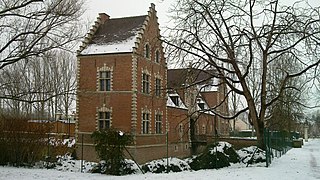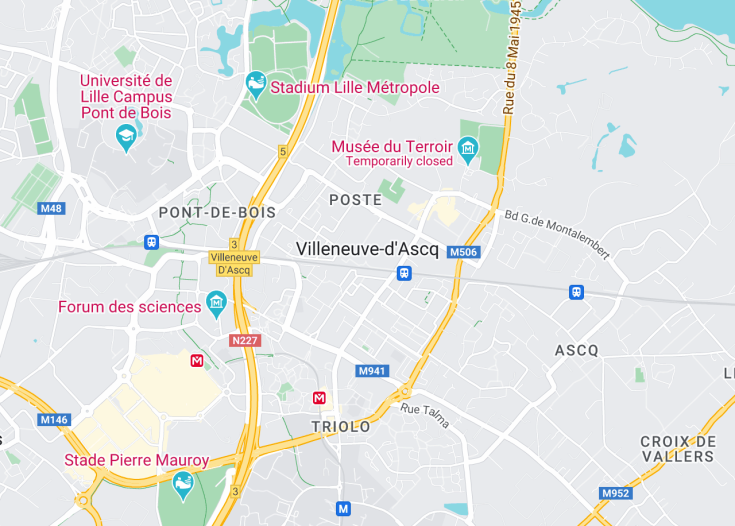Villeneuve-d’Ascq, a city in northern France, combines modernity with rich historical roots. Known as a vibrant academic hub due to its two major universities, it also boasts an array of cultural attractions like the modern LaM art museum and the traditional French châteaux. The city’s extensive green spaces and innovative urban planning make it a model of sustainable development. Plentiful shopping venues and sports facilities, including the renowned Stade Pierre-Mauroy, further enhance its appeal, offering a well-rounded visit for anyone exploring the Hauts-de-France region.
For an enriched experience, explore Villeneuve-d’Ascq’s blend of art and nature by visiting the LaM Museum followed by relaxing moments in the Parc du Héron.
To fully appreciate local life, try visiting during a university event or festival to experience the youthful and dynamic culture of the city.
Top things to do & see in Villeneuve-d’Ascq
Select the following sights and activities to discover best tickets and tours available in Villeneuve-d’Ascq.
Villeneuve-d’Ascq: A Vibrant Blend of History and Modernity
| Country | France |
| Time in Villeneuve-d’Ascq | GMT+1 |
| Language spoken | French |
| Population | 62,308 (source: latest census data) |
| Currency | Euro (€, EUR) |
| Airports |
|
Villeneuve-d’Ascq, a commune located in the Hauts-de-France region of France, beautifully intertwines rich historical landmarks with contemporary life. This city, often renowned for its significant contributions to science and education, hosts several universities and professional schools, making it a hub for academic excellence. The presence of the University of Lille introduces a vibrant, youthful energy that permeates its streets, making it an influential center for research and development in various scientific fields.
The historical aspect of Villeneuve-d’Ascq is charmingly preserved through well-maintained sites like the Château de Flers. This small castle, nestled within a picturesque park, dates back to the 17th century and now serves as a municipal museum. Alongside its historical resonance, the city is also home to modern attractions such as the Stade Pierre-Mauroy, which hosts numerous international sporting events and concerts, reaffirming the city’s cultural vitality.
Environmental sustainability is another cornerstone of Villeneuve-d’Ascq’s identity. It boasts an extensive network of public parks and gardens, such as Parc du Héron, which are local favorites for leisure and recreation. For shopping and entertainment, the city offers large shopping centers like V2, integrating global brands and dining options, reflecting its economically prosperous nature.
Community life in Villeneuve-d’Ascq is marked by its inclusivity and diversity. Annual events, such as the Festival of Science and the Open Days of Artists’ Workshops, showcase the city’s commitment to community involvement and the arts. These gatherings are not only tools for community engagement but also promote the richness of local and international cultures.
Where is Villeneuve-d’Ascq?
Located near the northeastern border of France, Villeneuve-d’Ascq lies in proximity to Belgium, offering accessibility to both French and Belgian cultural experiences.
Distances:
| Route | Distance by car | Time by car |
|---|---|---|
| Paris to Villeneuve-d’Ascq | 129 miles (208 km) | 2 hours, 20 minutes |
| Lille to Villeneuve-d’Ascq | 6 miles (10 km) | 15 minutes |
What is Villeneuve-d’Ascq famous for?
Villeneuve-d’Ascq is famous for its vibrant academic community, rich history, and commitment to green living, making it a unique blend of the past and the future.
History
Prehistoric Times to Middle Ages
The area now known as Villeneuve-d’Ascq has been inhabited since prehistoric times, as evidenced by archaeological discoveries in the region. It was later settled by various tribes, most notably the Gauls. Following the Roman conquest of Gaul, the area became part of Roman territory, which led to the development of infrastructure and the rise of agriculture. In the Middle Ages, the territory was part of the powerful County of Flanders, which led to further development and the establishment of several farms and churches, some of which can still be seen today.
16th Century to French Revolution
During this period, the area that would become Villeneuve-d’Ascq saw significant impacts from various conflicts including the French Wars of Religion and the Thirty Years’ War. The agricultural economy was the mainstay of the region. By the time of the French Revolution, the area was primed for change, moving away from feudal structures towards more democratic forms of governance.
19th Century to World War II
The 19th and early 20th centuries were a time of industrial expansion. Although Villeneuve-d’Ascq remained largely rural, the industrial revolution in nearby Lille influenced its development. The two World Wars had significant impacts on the region, with many memorials in Villeneuve-d’Ascq commemorating the residents who were affected.
Post-World War II to Present
After World War II, the area underwent substantial changes. In the 1970s, the new town of Villeneuve-d’Ascq was created, merging several smaller villages to accommodate the spillover population from Lille. This period marked significant urban development, with the establishment of the University of Lille and several scientific parks which transformed the town into a hub for higher education and technology. Today, Villeneuve-d’Ascq is known for its vibrant cultural scene, extensive green spaces, and modern infrastructure, making it a prominent city in the Hauts-de-France region.
Visit Villeneuve-d’Ascq
What to see and do in Villeneuve-d’Ascq
Exploring Villeneuve-d’Ascq offers a blend of cultural, historical, and modern attractions. Key sites include the modernist Villa Cavrois, designed by architect Robert Mallet-Stevens, and the Musée d’art moderne, contemporain et brut (LaM), which houses a remarkable collection of modern and outsider art. Nature enthusiasts can visit the scenic Parc du Héron, ideal for walking and bird watching.
- Villa Cavrois
- LaM – Musée d’Art Moderne
- Parc du Héron
Events in Villeneuve-d’Ascq
Villeneuve-d’Ascq plays host to various annual events that reflect its vibrant cultural tapestry. The Festival of Sciences, held in autumn, celebrates science and technology with workshops and exhibitions. The Jazz en Nord festival in winter features local and international jazz artists, providing rich musical experiences to residents and visitors alike.
Best time to visit Villeneuve-d’Ascq
The best times to visit Villeneuve-d’Ascq are spring and early autumn. These seasons offer pleasant weather, enabling visitors to fully enjoy the outdoor activities and events the city has to offer.
Is Villeneuve-d’Ascq worth visiting?
Villeneuve-d’Ascq is certainly worth visiting, thanks to its rich blend of history, art, and nature. The city appeals to a broad array of interests—from modern architecture enthusiasts to art lovers and nature seekers. Its proximity to Lille also makes it a convenient destination for travelers exploring the Hauts-de-France region. Whether you’re looking for a cultural getaway or a peaceful retreat in nature, Villeneuve-d’Ascq offers unique experiences to its visitors.










